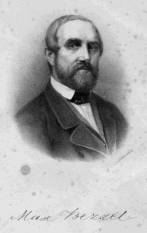Max Bezzel
Max Friedrich Wilhelm Bezzel (born February 4, 1824 in Herrnberchtheim , † July 30, 1871 in Ansbach ) was a German chess player and problem composer . He is considered the oldest Bavarian chess master. He became known primarily as the creator of the so-called ladies problem .
Life
Bezzel came from a pastor's family with many children and was born in the small village of Herrnberchtheim in Middle Franconia . His father was appointed high school professor in Ansbach in 1830 , but died three years later. This loss instructed the children early on to support their mother. He attended the Carolinum grammar school as a student and developed a special interest in mathematics . Because of that poor job prospects for mathematicians Bezzel but decided after high school graduation in 1841 to study law . Bezzel studied at the Universities of Erlangen and Munich ; During his studies in Erlangen, he joined the Bubenreuth fraternity in 1840 .
He completed his legal training in Ansbach. After it was temporarily used in other places, in 1854 the community college in Ansbach elected him to the legal council of the city. Bezzel, who remained unmarried, held this position until his death. Due to a serious illness, he died at the age of 47.
Bavarian chess master
As a chess player, Bezzel is almost forgotten today, but before 1870 he was the only well-known chess master in Bavaria. The family had already played the game during the father's lifetime. However, Bezzel rarely found the opportunity to test his skills. During the semester break he traveled to Vienna in 1844 and achieved great success. Without knowing more about it, Bezzel gained his reputation as the “Bavarian chess aar ”.
In September 1856 he visited Leipzig and had the upper hand against the chess master Herrmann Pollmächer (1826–1861) in a series of ten games (6: 1, = 3). In fact, his playing strength was valued highly by contemporaries. Max Lange even suggested him in his book on Paul Morphy as a possible opponent of revenge for the American chess genius who had defeated the German pioneer Adolf Anderssen in Paris in 1858 .
Bezzel was not directly involved in founding the Ansbach chess club in 1855. In 1857, however, he became an honorary member of the club, which is one of the oldest German chess clubs . Bezzel, who was also an excellent blind player , rarely came to the practical game for professional reasons. After his appearance in Leipzig, he also seems to have stopped actively looking for such opportunities.
To a greater extent he remained devoted to problem chess. Bezzel distinguished himself as a composer and solver of chess problems. He was very fruitful in drafting profound self- defeating tasks.
Significance for chess mathematics
By addressing the mathematical side of chess that fascinated him, Bezzel earned his greatest merit. The formulation of the “eight queens problem” (see also the main article on the women’s problem ) has caused a stir up to the present day .
In September 1848, Bezzel put in the Berliner Schachzeitung - under the pseudonym "Schachfreund" - the task of placing eight queens on a chessboard in such a way that no one can beat the other on the next move. Eight queens are the maximum number that can be placed on the board without attacking each other. The mathematical problem extended to the number of possible solutions and even preoccupied the famous mathematician Carl Friedrich Gauss . Bezzel himself could not completely solve the problem. As early as 1850, Franz Nauck gave the correct number 92 in the Leipziger Illustrirten Zeitung . It was later proven that there were no more solutions.
In addition to the more complicated knight problem, the queens problem conceived by Bezzel is the best known task in chess mathematics .
literature
- Ludwig Bachmann : From bygone times. Pictures from the history of the development of the practical game of chess. Volume 2. Berlin 1920-1922, pp. 261-264.
- Alfred Diel : No opportunity for the highest level of fame. In: Kaissiber . No. 3, July-September 1997, pp. 70-71.
Web links
- Hans Siegfried: Max Friedrich Wilhelm Bezzel ( Memento from March 4, 2016 in the Internet Archive ) Bezzel's biography on the Ansbach chess club website
- Some compositions by Max Bezzel on the PDB server
Individual evidence
- ↑ Ernst Höhne: The Bubenreuther. History of a German fraternity. II., Erlangen 1936, p. 149.
- ^ Theodor Rosa: A short history of the Ansbach chess club , self-published in 1931
| personal data | |
|---|---|
| SURNAME | Bezzel, Max |
| ALTERNATIVE NAMES | Bezzel, Max Friedrich Wilhelm (full name) |
| BRIEF DESCRIPTION | German chess player and problem composer |
| DATE OF BIRTH | February 4, 1824 |
| PLACE OF BIRTH | Herrnberchtheim |
| DATE OF DEATH | July 30, 1871 |
| Place of death | Ansbach |
